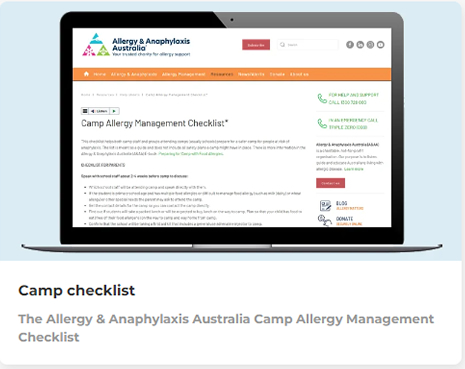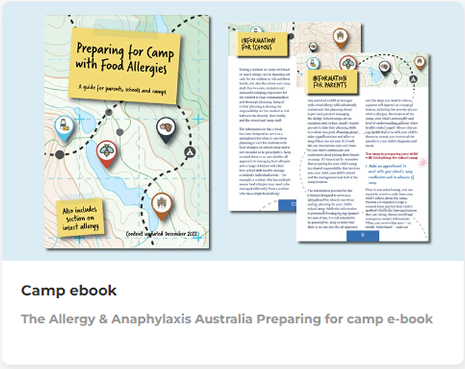Going to camp offers children a range of experiences that they do not usually encounter at home. For children with food allergy, parents and their child, along with camp coordinators and camp staff need to work together to manage food allergies safely at camp.
For school camps the Allergy Aware website provides Best Practice Guidelines for anaphylaxis prevention and management in schools and other useful resources such as risk minimisation strategies.
Planning ahead is critical, particularly for food allergies
1. Check your child’s medications
-
Ensure they have two adrenaline injectors (EpiPen®s or Anapen®s) within their expiry date and their ASCIA Action Plan is current. The ASCIA Action Plan is usually updated each time your child’s adrenaline injector prescription is provided.
-
Ensure that other medications (such as antihistamines, asthma reliever puffers) are also within expiry.
2. Meet with the camp coordinator well in advance to discuss:
-
Have all staff attending the camp completed anaphylaxis training?
-
For younger primary school children, is it possible for parents to volunteer (if they want to)?
-
Who will be catering for the camp?
-
Are there any planned activities that involve food?
-
Is it possible to provide meals and/or snacks? It is not recommended that camp activities involve food.
-
Where will the adrenaline injectors be stored? Discuss if older children should carry their own adrenaline injector.
-
What is the Emergency Response plan for the camp?
3. Speak to the camp operators in advance to discuss:
-
Have camp staff completed food allergen management anaphylaxis training?
-
How do they manage food allergies at their camp facility?
-
Is there a written procedure for managing food allergies?
-
Has the correct information about their child’s food allergies been provided (for example, by the camp coordinator)?
-
What strategies have been put in place to reduce the risk of your child being exposed to what they are allergic to?
-
Is it possible to remove peanuts and tree nuts from the menu while your child is on camp, if your child is allergic to these foods?
-
Are there any off-site activities planned and how will allergies be managed when off-site?
-
Does the campsite have a written emergency response plan for anaphylaxis?
-
Can emergency care (such as an ambulance) access the camp and how far away is the nearest ambulance service and hospital?
4. Speak to the chef or cook at the camp at least 2 weeks in advance . This will give them enough time to plan and order food for your child. Ask them:
-
Have the staff who prepare and serve food completed the All about Allergens for Camps online training?
-
What strategies do they have in place to make sure campers with food allergies are given appropriate meals?
-
How do they reduce the risk of cross contamination with food allergens?
-
Request a copy of the camp menu and discuss alternatives for your child where appropriate.
-
How is food served to campers? Is there any buffet service and if so, is this supervised by the catering staff? Can your child be served their meal first?
-
Is there a specific catering staff member who attends to those with food allergies and other dietary needs?
-
What storage facilities are available for meals brought from home? How do catering staff handle the re-heating and serving of these meals if provided?
If you are concerned about the ability of the camp to provide appropriate meals (particularly if your child has multiple allergies), consider providing your own meals.
Often the main meals can be catered for, but snacks may need to be provided, depending on the food allergies being managed.
If you provide meals for your child:
-
Make sure you provide the meals in sealed containers clearly labelled with your child’s name.
-
If you are providing snack foods, make sure the packaging is unopened or that the snack is in a sealed container if it is open. Snack foods should also be clearly labelled with your child’s name.
For more information
Allergy & Anaphylaxis Australia’s camp checklist
Allergy & Anaphylaxis Australia’s Preparing for camp e-book is available for download here
Content created May 2024.


